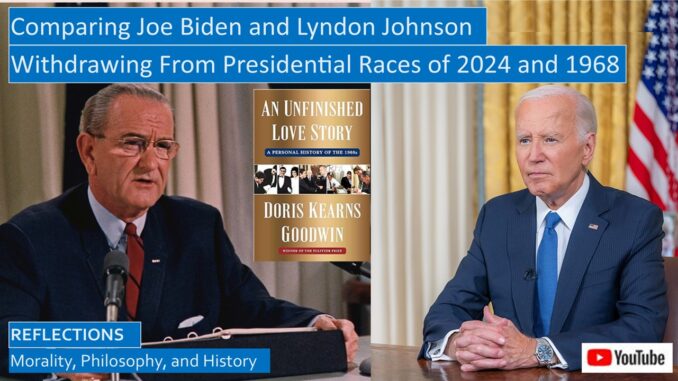
What were the similarities and differences between Joe Biden’s withdrawal from the Presidential Race of 2024, and Lyndon Johnson’s withdrawal in 1968? What were the causes?
What were the effects of the Presidential Debates of 2024 and 1960 on the Presidential Campaigns?
How does his daughter, Luci Baines Johnson, remember her father’s speech when he withdrew from the Presidential Race in 1968?
YouTube video for this blog: https://youtu.be/WkGXJEEBMpc
COMPARING BIDEN’s and JOHNSON’s WITHDRAWAL SPEECHES
A few weeks ago, in July 2024, before the Democratic Convention, Joe Biden addressed the nation:
“You know, in recent weeks, it’s become clear to me that I needed to unite my party in this critical endeavor. I believe my record as president, my leadership in the world, my vision for America’s future all merited a second term, but can come in the way of saving our democracy. That includes personal ambition.” “So, I’ve decided the best way forward is to pass the torch to a new generation. That’s the best way to unite our nation.”
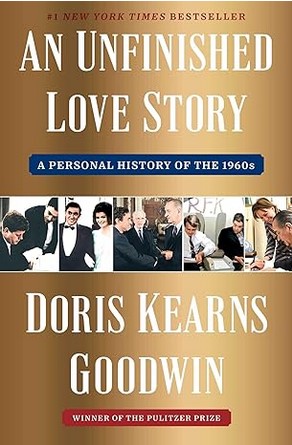
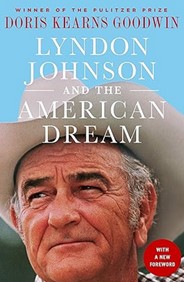
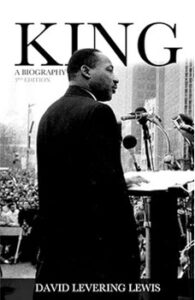
Biden continued: “Over the next six months, I’ll be focused on doing my job as president. That means I will continue to lower costs for hardworking families and grow our economy. I’ll keep defending your personal freedoms and your civil rights, from the right to vote to the right to choose. And I’ll keep calling out hate and extremism and make it clear there is no place in America for political violence or any violence ever, period.”[1]
This was not the first time a sitting President announced they would not run for reelection. In 1968, after winning a landslide election in 1964, earning a mandate to pass the Great Society legislation, Lyndon Johnson’s administration got bogged down in the Vietnam War he inherited, an incredibly unpopular conflict drawing in American soldiers by the hundreds of thousands.
Lyndon Johnson addressed the American people on television on March 31, 1968, first announcing that the massive bombing campaign against North Vietnam would be unilaterally halted. The truth was that the Air Force was running out of targets.
Then LBJ somberly announced, dropping a political bombshell: “There is divisiveness among us all tonight.” “I do not believe that I should devote an hour or a day of my time to any personal partisan causes.” “Accordingly, I shall not seek, and will not accept, the nomination of my party for another term as your President.”
WHY DID LYNDON JOHNSON WITHDRAW FROM THE PRESIDENTIAL RACE?
To compare Biden’s withdrawal from the Presidential race to Lyndon Johnson’s withdrawal, we need to remember the American history of the Sixties, which was a history of multiple assassinations, beginning with Kennedy’s assassination in 1963.
The newly sworn-in President Lyndon Johnson leveraged sympathy with Kennedy’s legacy to pass the first Civil Rights Act of 1964, which was the first piece of legislation implementing the Great Society, which includes Medicare, Medicaid, education funding, expanded Food Stamp program, increased Social Security benefits, consumer protection, the establishment of HUD and Department of Transportation, and many other programs essential to American prosperity and welfare.
John F Kennedy, Cuba, Russia, and Civil Rights, Book Review of An Unfinished Love Story
https://seekingvirtueandwisdom.com/john-f-kennedy-cuba-russia-and-civil-rights-review-of-an-unfinished-love-story/
https://youtu.be/krkJki2vQ2o
The Great Society programs were broadly popular, and public opinion turned against the segregationist Southern Sheriffs when their bloody suppression of peaceful protesters mobilized by Martin Luther King and other black leaders was televised for all of America to see on their living room television sets. The nomination of the far right-wing extremist Barry Goldwater as the Republican nominee guaranteed that Lyndon Johnson’s election in 1964 would be a landslide, in contrast with the narrow win by Joe Biden in 2020. The three television networks dominated the news in Johnson’s era. Both television and newspapers strove to be non-partisan, all Americans consumed the same news stories.
Lyndon Johnson, Enacting the Great Society and Vietnam, Review of an Unfinished Love Story
https://seekingvirtueandwisdom.com/lyndon-johnson-enacting-the-great-society-and-vietnam-review-of-an-unfinished-love-story/
https://youtu.be/MgVEipHdvfM
But Lyndon Johnson was dogged by the growing Vietnam War. American generals remembered how Hitler had benefited from British Prime Minister Neville Chamberlain’s appeasement of Hitler backfired on the Allies when Nazi Germany invaded Poland after swallowing Austria and Czechoslovakia. Communist aggression had been successfully halted in the Korean War the prior decade. There was great reluctance to withdraw from Vietnam even when victory became more and more uncertain.
Many mistakes had been made by the Kennedy administration in the steadily growing conflict in Vietnam. LBJ tried to keep the lid on the conflict but was forced to commit more and more American troops to prevent the complete collapse of the South Vietnamese government under relentless attacks by the Viet Cong guerillas and the North Vietnamese Army. Eventually, over four hundred thousand American troops fought and died in the jungles of Vietnam.
In January 1968, the Viet Cong and North Vietnamese launched the Tet Offensive, attacking positions across South Vietnam, including its capital in Saigon. The enemy was initially successful, several cities were captured, but the spontaneous uprising of ordinary citizens that the North Vietnamese were expecting never materialized. Although the South Vietnamese were victorious militarily, severely weakening the Viet Cong forces, the sense of security was shattered in South Vietnam, and the public opinion of the Americans, witnessing the carnage on their living room television sets, profoundly turned against the war, seeing it as unwinnable.
Presidency of Lyndon Baines Johnson, Civil Rights, Great Society, and Vietnam War
https://seekingvirtueandwisdom.com/presidency-of-lyndon-baines-johnson-civil-rights-great-society-and-vietnam-war/
https://youtu.be/lydW8mfpJGQ
In her biography of Lydon Johnson, Doris Kearns Goodwin remembered that the sudden success of the Tet Offensive forces against what “appeared to be impregnable areas deep with South Vietnam suddenly exposed the falsity of the administration’s optimistic progress reports. Until Tet, the Vietcong were forced to fight in jungles or villages, striking quickly and moving on, their true vitality hidden and, therefore, more easily concealed from the American people. Now the news of captured cities, and the films of skirmishes shown on the TV screen night after night, exhibited the other side’s strength.”
Kearns continues: “What happened at Tet taught the American public an entirely different lesson from the one Johnson had intended to convey.” The approval rating for Johnson’s handling of the Vietnam War dropped from 40 to 26 percent in six weeks, echoed by an even greater loss of confidence by the print and television media. Johnson lost credibility, “a majority of people believed he regularly lied to them.”[2]
By the end of March 1968, LBJ’s approval rating had dropped to 36 percent, the lowest level of his presidency, and only 26 percent supported his handling of the war. His generals recommended committing another 200,000 troops, but he knew the North Vietnamese would simply match the increase. The massive bombing was ineffective. How could America break this stalemate?
Johnson told his speechwriter, “I want out of this cage.” To break the stalemate, Johnson delivered a televised speech addressed to all Americans: “Tonight I want to speak to you of peace in Vietnam,” offering to “stop the bombardment of North Vietnam unilaterally.” If Hanoi responded, he would withdraw American forces as Hanoi withdrew its forces to the North.
Then Johnson stunned America further. “With America’s sons in the fields far away, with America’s future under challenge here at home, I do not believe I should devote an hour or a day of my time to any personal partisan causes or to any duties other than the awesome duties of this office, the Presidency of your country.”[3]
One major difference between Johnson and Biden announcing they would not run for reelection was that Lyndon Johnson withdrew due to the popular discontent over the Vietnamese War, a war in which America was mired for yet another seven long years under Richard Nixon.
Joe Biden, in contrast, did not lose the confidence of the American people for policy failures. Joe Biden’s image was not damaged by attacks by stubborn foreign armies in Asian jungles, but rather by the inevitable ravages of old age. We previously compared Biden’s and Nixon’s performance in the Presidential Debates of 2024 and 1960, noting how Donald Trump in 2024 and John F Kennedy in 1960 appeared to perform better on television. Those listening to the 1960 debates on the radio thought that Nixon had won the debate. Both Joe Biden in 2024 and Richard Nixon in 1960 arguably had coherently logical arguments, but that does not matter. In politics, appearance is reality. Since Biden prevailed over Trump in their 2020 debate, his failure to think on his feet in 2024 was devastating.
Biden sought to reassure American voters of his competence by numerous public appearances, and though he proved he was capable of nuanced and intelligent responses in a NATO press conference, his gaffes continued. Now they were not blamed on his stammer, but on his advanced age. Even in his stepping-down speech he just seemed old.
Trump-Biden Debate, Compared to Kennedy-Nixon 1960 TV Debates
https://seekingvirtueandwisdom.com/trump-biden-debate-compared-to-kennedy-nixon-1960-tv-debates/
https://youtu.be/_YvIst9oxXo
Cullen Murphy of the Atlantic magazine interviewed Doris Kearns Goodwin, she provided additional insights into Lyndon Johnson’s withdrawal from the Presidential race. He notes that Johnson had serious health issues. “Johnson had suffered a major heart attack in 1955, and the men in his family had a history of early deaths. In 1967, he initiated a secret actuarial study on his life expectancy. He was told he would die at 64, a prediction that came to pass.” As Goodwin noted, “he would have died in that next term, if he’d had a second term.”
Doris Kearns Goodwin, who was an aide to Johnson and ultimately his biographer, remembers: “What Johnson talked to me about later was more personal,” Goodwin went on. “He knew he couldn’t go out on the streets without being bombarded by people carrying signs. How many kids did you kill today?”
Goodwin continues: “There was no pleasure any longer in the part of politics that LBJ had always loved: being out with people. He told me that he had this nightmare regularly—that he was in a river, and he was trying to get to shore, and he went toward the shore on one side, and then he couldn’t reach the shore, so he turned around, figuring he was going the wrong way, and he couldn’t reach the shore on the other side either. He was just caught in the middle.”[4]
Possibly another factor in LBJ’s decision to step down was his deep unpopularity in the conservative Jim Crow South. Some have speculated that Johnson thought he would be a one-term President because of his ardent support of civil rights legislation.
Dick Goodwin, a speechwriter for Lyndon Johnson, admired his political courage in pushing through as much civil rights legislation as possible, even though it was controversial. Dick Goodwin commented: “Impressive, a huge risk at the time. LBJ knew the path he was taking would cut him off from the southern bloc that was his heritage, isolate him from his oldest friends, and might well not succeed. But he was willing to take the path.”[5]
After signing the Civil Rights Bill of 1964, LBJ was in a melancholy rather than a festive mood. Johnson told Bill Moyers, “I think we just delivered the South to the Republican Party for a long time to come.”[6]
The Democratic Party was damaged by domestic chaos after Johnson’s speech, which helps to explain why the Democratic Party is so eager to unite behind Kamala Harris. Just as there was an attempted assassination of Donald Trump in 2024, there were several assassinations after Johnson’s speech. Martin Luther King was assassinated in April 1968, and Robert F Kennedy was assassinated in June 1968, after winning the California Democratic primary. Whereas LBJ was able to use King’s assassination to pass the Fair Housing Act, the last great civil rights legislation to be passed, the widespread riots after King’s assassination soured the public on further civil rights initiatives. Although LBJ’s Vice-President Hubert Humphrey was able to win the nomination, the Democratic Convention of 1968 was absolute chaos, plagued by violence and political protests, further alienating public opinion, and leading to Nixon’s narrow victory in the 1968 elections.
Martin Luther King & LBJ: Great Society, Vietnam, Chicago & Memphis, Lewis Biography Chapters 10-12
https://seekingvirtueandwisdom.com/martin-luther-king-lbj-great-society-and-vietnam-northern-civil-rights-biography-chapters-10-12/
https://youtu.be/IeKssG8mrlk
LUCI BAINES JOHNSON REMEMBERS HER FATHER
Erin Burnett of CNN interviewed Luci Baines Johnson, daughter of former president Johnson, comparing Biden’s withdrawal from the Presential race to her father’s withdrawal.
Luci Johnson remembers: “When President Biden made his speech conceding that he was not going to run for reelection, it was just a magical moment. We all were pinching ourselves because, as he had said to us, he cared a lot about the office, but he cared most about his country. My father made a similar decision because he cared so much for his country, and both of them cared tremendously about civil rights, and its importance.”
Luci Johnson continues, “The 1964 Civil Rights Act was signed on my 17th birthday, and my sweet father didn’t have time to go to a drugstore and pick up a card. So, he wrote me a love letter on White House stationery, even noting the time of day. I think with the hope that one day I would realize just what an incredible birthday gift I had, that was the end of what was really legal apartheid in the United States.”
“Years later, I got to walk over the Pettus Bridge with Vice-President Biden, and we held John Lewis’s hand, and we went with the force and determination to continue this fight, which is not over.”
Erin asked Luci Johnson: “You know, we look in history, and the last time that someone walked away from that second term was your father. How many similarities do you see between President Johnson and President Biden?”
Luci Johnson responded: “Well, I see a great love and passion and long service in the Senate, the Vice-Presidency, and the Presidency. I see a commitment to social justice that both felt fervently to their last breaths. I see the President’s willingness to do whatever it takes to give the best service to this country,” and they both said, if the time to “pass the baton has come, I do so gladly. I saw that in my father. I see that in President Biden. And it was a moment where you felt you were in front of a great American hero. The room was electric, and I was in the room where it happened.”
Luci Johnson concluded, “I went to Washington, DC on the People’s March,” to fight for “social justice for all of us, black and white and ethnic ethnicities of all kinds. People need basic food, they need basic nutrition, they need basic health care, and they need basic education. These should be rights of all Americans.”[7]
DISCUSSING THE SOURCES
Since we reflected on Doris Kearns Goodwin Unfinished Love Story, with both her and her late husband Richard’s memories of the Kennedy and Johnson administrations, and Doris’ prior biography of Lyndon Johnson, we have noticed several parallels to current events. Richard Goodwin was an aide and speechwriter for Kennedy and Johnson, and later for Robert Kennedy and Eugene McCarthy, while Doris Kearns Goodwin served on Johnson’s staff, then practically lived with LBJ on his ranch while she was writing his biography. She recorded so many hours of interviews that it is almost an autobiography. They met and married many years after they served in the White House.
We also reflected on their recollections on the Cuban Missile Fortieth Reunion, hosted by Fidel Castro himself in Havanna, Cuba, and how Richard Goodwin and Jackie Kennedy helped save the priceless treasures on Ancient Egypt from being flooded by the rising Aswan Dam reservoir.
Cuban Missile Crisis, Forty Year Reunion, Compared to War in Ukraine
https://seekingvirtueandwisdom.com/cuban-missile-crisis-forty-year-reunion-compared-to-war-in-ukraine/
https://youtu.be/gOQMH9-v4bE
Saving Ancient Egyptian Monuments From Aswan Dam’s Rising Waters, from Unfinished Love Story
https://seekingvirtueandwisdom.com/jackie-kennedy-and-richard-goodwin-save-ancient-egyptian-monuments-from-aswan-dams-rising-waters/
https://youtu.be/FywSKdDmk88
We have a series of reflections based on David Levering Lewis’ excellent biography of Martin Luther King, on his youth and career, and on his protests in Montgomery, Selma, Alabama, Birmingham, and other cities.
Martin Luther King, Youth and Schooling, Lewis’ Biography Chapters, 1 and 2
https://seekingvirtueandwisdom.com/martin-luther-king-youth-and-schooling-lewis-biography-chapters-1-and-2/
https://youtu.be/_64FMZ6AlEg
Martin Luther King and Rosa Parks, Montgomery Bus Boycott, Lewis’ Biography, Chapter 3
https://seekingvirtueandwisdom.com/martin-luther-king-and-rosa-parks-montgomery-bus-boycott-lewis-biography-chapter-3/
https://youtu.be/TuiyFycWE-U
Martin Luther King, Lunch Counters, Freedom Riders, and Albany, Lewis’ Biography Chapters 4-6
https://seekingvirtueandwisdom.com/martin-luther-king-lunch-counters-freedom-riders-and-albany-lewis-biography-chapters-4-6/
https://youtu.be/_TLt2fQqL4w
Martin Luther King, Birmingham, Nonviolent Protests v Bombs and Brutality, Biography Chapter 7
https://seekingvirtueandwisdom.com/martin-luther-king-birmingham-nonviolent-protests-v-bombs-and-brutality-biography-chapter-7/
https://youtu.be/5y0v0tYMdy8
We ponder on Martin Luther King’s Letter from a Birmingham Jail and his short I Have a Dream Speech, and his protests in Chicago and Memphis, where he was assassinated.
Comparing MLK’s Letter from Birmingham Jail with Hannah Arendt’s Banality of Evil in Nazi Germany
http://www.seekingvirtueandwisdom.com/comparing-martin-luther-kings-letter-from-the-birmingham-jail-with-hannah-arendts-the-banality-of-evil/
https://youtu.be/PqFAUEXbi8k
Martin Luther King, I Have a Dream Speech, March on Washington DC, Biography Chapter 8
https://seekingvirtueandwisdom.com/martin-luther-king-i-have-a-dream-speech-march-on-washington-dc-biography-chapter-8/
https://youtu.be/IJ64y3nQA4Q
Martin Luther King, Bloody Struggles in Mississippi and Selma, Lewis’ Biography Chapters 8-9
https://seekingvirtueandwisdom.com/martin-luther-king-bloody-struggles-in-mississippi-and-selma-lewis-biography-chapters-8-9/
https://youtu.be/eMA_7vLYcdM
Martin Luther King & LBJ: Great Society, Vietnam, Chicago & Memphis, Lewis Biography Chapters 10-12
https://seekingvirtueandwisdom.com/martin-luther-king-lbj-great-society-and-vietnam-northern-civil-rights-biography-chapters-10-12/
https://youtu.be/IeKssG8mrlk
We also have a summary of these reflections.
Martin Luther King, Summary of Biography by David Levering Lewis
https://seekingvirtueandwisdom.com/martin-luther-king-summary-of-biography-by-david-levering-lewis/
https://youtu.be/XtdVGx2C3Cc
[1] https://abcnews.go.com/Politics/read-bidens-prime-time-oval-office-address-decision/story?id=112246959
[2] Doris Kearns Goodwin, Lyndon Johnson & the American Dream (New York: Signet Book, 1976), Chapter 11, Under Siege in the White House, pp. 351-368 and https://en.wikipedia.org/wiki/Great_Society and https://en.wikipedia.org/wiki/Tet_Offensive
[3] Doris Kearns Goodwin, An Unfinished Love Story (New York: Simon and Schuster, 2024), Chapter 11, Crosswinds of Fate, pp. 330-332.
[4] https://www.theatlantic.com/newsletters/archive/2024/07/the-last-time-a-president-dropped-out-of-the-race/679246/
[5] Doris Kearns Goodwin, An Unfinished Love Story, Chapter 6, Kaleidoscope, p. 152.
[6] Doris Kearns Goodwin, An Unfinished Love Story, Chapter 7, Thirteen LBJ’s, p. 187.
[7] Lyndon Johnson’s daughter calls Biden concession a magical moment, CNN YouTube Channel, 7/29/2024, https://www.youtube.com/watch?v=LvaTytpx1Zo&t=70s

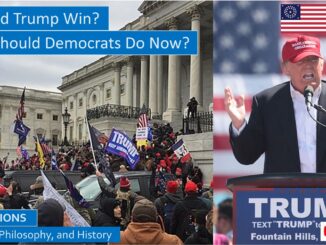
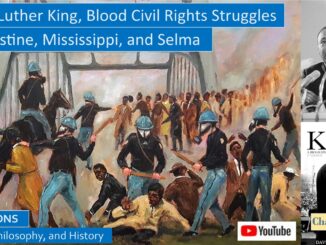
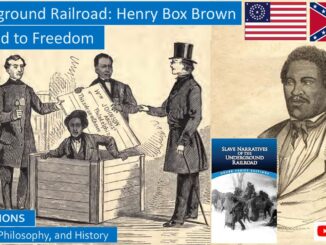
Be the first to comment